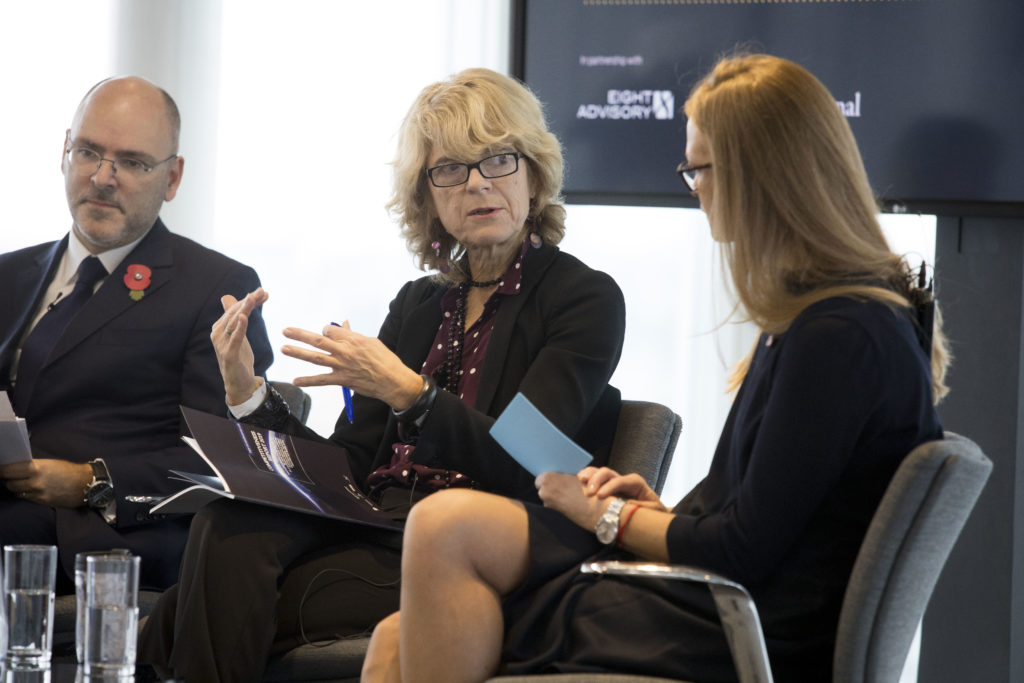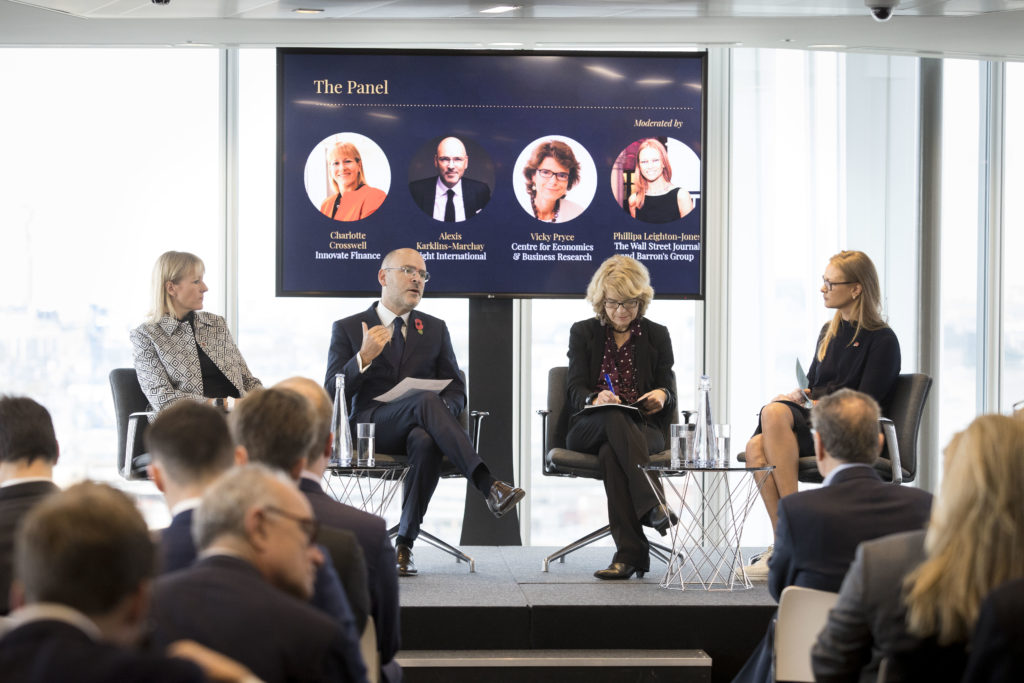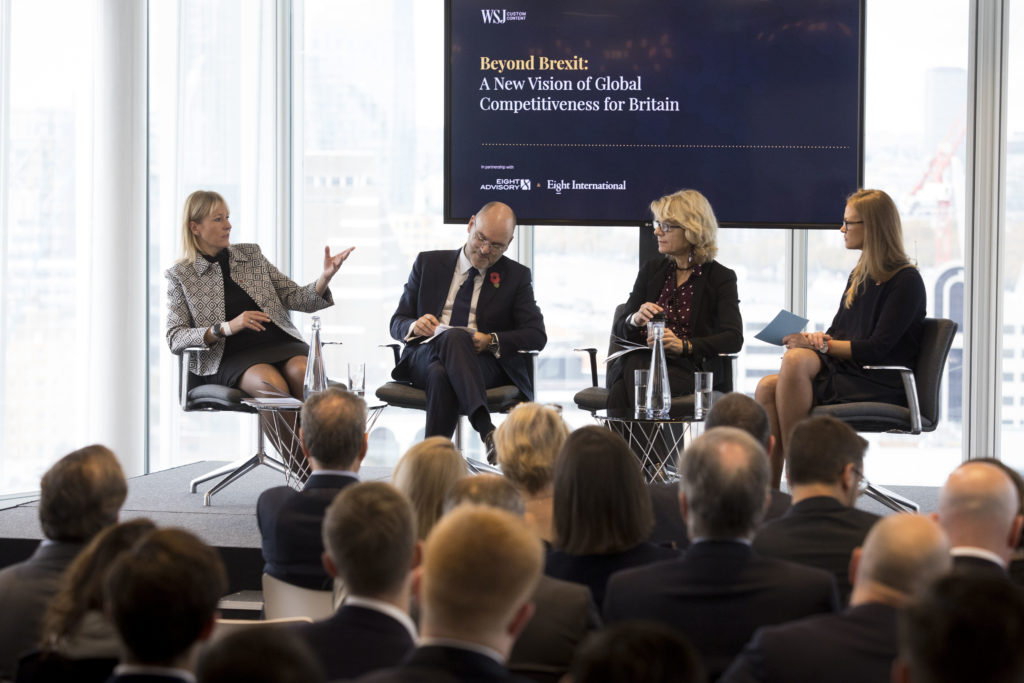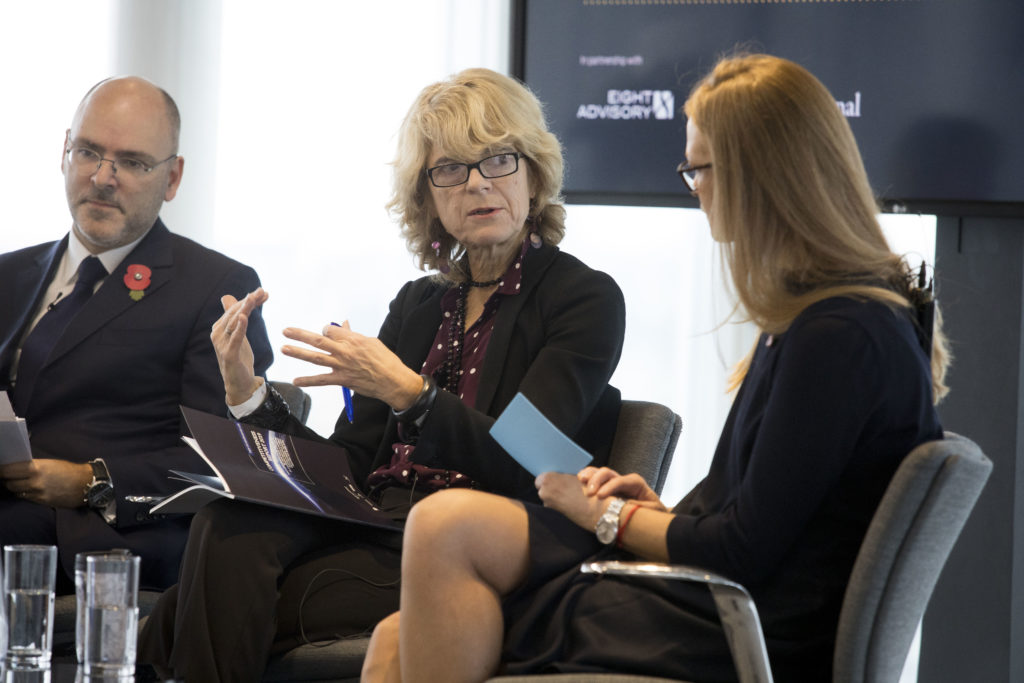
Eight Advisory & Eight International-Led Panel Identifies Dynamics for Globally Competitive U.K. Beyond Brexit
Experts back up report’s conclusion that factors such as education, innovation and improved living standards, not low wages or taxes, are crucial for flourishing business environments and raising global competitiveness.
At Eight Advisory & Eight International’s London panel event, “Beyond Brexit: A New Vision of Global Competitiveness for Britain” on Nov. 7, 2019, over 70 invited guests from the business, finance, economic and tech sectors convened to hear experts discuss the competitiveness of the U.K., also in light of its possible exit from the European Union.
The panel comprised Alexis Karklins-Marchay, Partner, Eight Advisory & Founding Member, Eight International, Charlotte Crosswell, CEO, Innovate Finance, and Vicky Pryce, Chief Economic Advisor, Centre for Economics and Business Research.

“I promise this will be the most interesting conversation you will hear on Brexit,” said panel host Phillipa Leighton-Jones, Editor-at-Large with The Trust at WSJ Barron’s, partner for the event. “One of the big findings in Eight’s recent report on factors that contribute to competitiveness was that economic development and personal happiness go hand in hand with a favorable business environment. Are today’s companies alive to that?”
Alexis Karklins-Marchay said: “Competitiveness is the ability of a nation to benefit from global integration, to drive a rising standard of living for the entire population. This is about happiness and wellbeing, about having a decent life, and inclusiveness is very important.”

Eight’s report, which provided an unprecedented, holistic approach to prosperity also beyond traditional economic measures, is unique in that it uses 38 independent renowned indices and 25 authoritative reports to analyze the world’s economies. It found that a crucial formula for a favorable business environment and competitive economy is a sustained focus on wellbeing, political and social stability and a rigorous focus on the highest educational standards. On those measures, Sweden, the Netherlands and France scored highly. The U.K. continues to rank highly in a number of key areas, including the business environment and higher education; however, it performs poorly in several areas that are fundamental to the country’s long-term competitiveness.
Charlotte Crosswell, whose not-for-profit membership association Innovate Finance represents the U.K.’s global FinTech community, said the notion of happiness and wellbeing was well understood in her sector. “We hear more talk about social values and social purpose. People are asking themselves ‘Well, what do I want to do in my life? I’m not really sure. But I want to be happy.’”

Vicky Pryce, one of the foremost economists in the U.K., added: “The mindset is changing. The [London] Stock Exchange said only this morning that trading should happen in shorter hours to offer more flexibility—you can take your kids to school, for example. Flexibility improves productivity and increases retention. Rethinking the patterns of work is going to be very significant.”

Ms. Leighton-Jones asked whether the U.K. was successfully competing on these new measures. She asked: “Education, environment and social inclusivity are absolutely pivotal to competitiveness. Narrowing this back down to Britain, how are we doing on those dynamics? Do we think investors are looking at these factors?”
Mr. Karklins-Marchay said: “When you look at the countries that are highly ranked for productivity, you always find the education behind it. Britain has probably the best universities in the world, alongside the U.S. I’m pretty optimistic, seeing that almost all [U.K. political] parties are conscious that if we want to increase productivity in Britain we have to invest in education.”
Ms. Pryce added: “In my work for the [U.K.] Government, we have run entrepreneurial courses where businesses go in and talk to school pupils aged 14-16, preparing them [for life] after A Levels if they decide not to go to university but to do something else. When we evaluated the impact, boys who were taught this became twice as likely to want to start their own business and girls four times as likely. If you put them close to business, they get really excited.”
With the U.K.’s immediate political future still in flux, Ms. Leighton-Jones asked what dynamics are specifically British, and whether they would remain after Brexit.
Ms. Pryce said: “The U.K. is a reasonably big market and one of the biggest economies. It has a long tradition of being very open. We’re still one of the world’s main financial sectors and that’s probably going to continue. Then there’s the financial services sector, which is unlikely to change overnight.”https://view.ceros.com/wsj/8-advisory-carousel
Mr. Karklins-Marchay added: “The overall picture of the U.K. economic and business environment is favorable and will remain so, providing this country creates a great trade environment and doesn’t think of itself as isolated from the rest.”
Ms. Leighton-Jones asked whether technology—a particular bright spot for the U.K.—is being seen as a bellwether for competitiveness. She said: “This is no small win for the U.K., because tech is pivotal to future growth. What factors are attracting people to set up here?”
Ms. Crosswell said: “Every single week, we get calls from other countries—in South America, the Middle East, Eastern Europe and China—saying, ‘We want to come and learn from you about how to set up a fintech hub.’ We’ve always done innovation very well in this country, so obviously we want to foster that [reputation] and grow it. We’ve also had a pretty relaxed immigration policy: over 40% of our fintech sector comes from outside the U.K. There’s a real global race for talent.”
Ms. Leighton-Jones asked the panelists to share their thoughts with potential investors in the U.K. who were eyeing continuing uncertainty over the U.K.’s political landscape as a risk. “If you were an investor, would you invest here, and what’s the one piece of advice you would leave the people in this room with about how to think about the Britain of the future?”
Mr. Karklins-Marchay said: “There’s very much a wait-and-see attitude [among] investors in this country. The short term is not really positive for business here—because of the uncertainty and current global economic environment, it’s not that favorable. If you look at the medium and long term, the structural factors will prevail. We still don’t know what’s going to happen, but this country is still running. And we’re still investing in Britain.”

Contact: [email protected] & [email protected]





















































